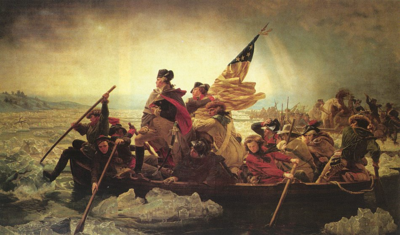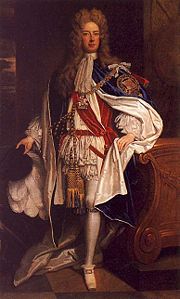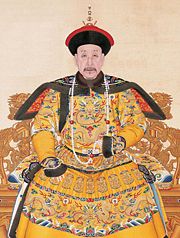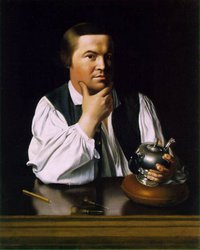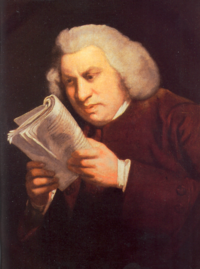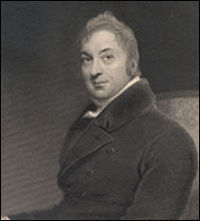18th century
2008/9 Schools Wikipedia Selection. Related subjects: General history
| Millennium: | 2nd millennium |
|---|---|
| Centuries: | 17th century · 18th century · 19th century |
| Decades: | 1700s 1710s 1720s 1730s 1740s 1750s 1760s 1770s 1780s 1790s |
| Categories: | Births – Deaths Establishments – Disestablishments |
The 18th century lasted from 1701 to 1800 in the Gregorian calendar, in accordance with the Anno Domini era numbering system.
Historians sometimes specifically define the 18th century otherwise for the purposes of their work. For example the "short" 18th century may be defined as 1715-1789, denoting the period of time between the death of Louis XIV of France and the start of the French Revolution, while the "long" 18th century may run from the Glorious Revolution of 1688 to the battle of Waterloo in 1815 or even later.
Events
1700s
- 1712- 21: Russia supplants Sweden as the dominant Baltic power after the Great Northern War.
- 1701- 1714: War of the Spanish Succession was a conflict which involved most of Europe.
- 1702- 1715: Camisard Rebellion in France.
- 1703: Saint Petersburg founded by Peter the Great. Russian capital until 1918.
- 1703- 1711: The Rákóczi Uprising against the Habsburg Monarchy.
- 1707: Act of Union passed merging the Scottish and the English Parliaments, thus establishing The Kingdom of Great Britain.
- 1707: After Aurangzeb's death, the Mughal Empire enters a long decline.
- 1708- 1709: Famine killed one-third of East Prussia's population.
1710s
- 1715: First Jacobite Rebellion breaks out
- 1715: Louis XIV died leaving France deep in debt.
- 1718: City of New Orleans founded by the French in North America
- 1718: Blackbeard is killed by Robert Maynard in a North Carolina inlet on the inner side of Ocracoke Island
1720s
- 1720: The South Sea Bubble
- 1720- 1721: The Great Plague of Marseille
- 1721: Robert Walpole became the first Prime Minister of Great Britain ( de facto).
- 1721: Treaty of Nystad signed, ending the Great Northern War.
- 1722- 23: Russo-Persian War
- 1722: Afghans conquered Iran, ending the Safavid dynasty.
- 1722: Kangxi Emperor of China died.
- 1722: Bartholomew Roberts is killed in a sea battle off the African coast.
- 1723: Slavery abolished in Russia. Peter the Great converted the household slaves into house serfs.
- 1723- 1730: The "Great Disaster" - an invasion of Kazakh territories by the Dzungars.
- 1725: The Fulani nomads took complete control of Fuuta Jallon and set up the first of many Fulani jihad states to come.
- 1726: The enormous Chinese encyclopedia Gujin Tushu Jicheng of over 100 million written Chinese characters in over 800,000 pages is printed in 60 different copies using copper-based Chinese movable type printing.
1730s
- 1732- 1734: Crimean Tatar raids into Russia.
- 1733- 38: War of the Polish Succession.
- 1735- 39: Russo-Turkish War.
- 1735-99: The Qianlong Emperor of China oversaw a huge expansion in territory.
- 1736: Nadir Shah assumed title of Shah of Persia and founded the Afsharid dynasty. Ruled until his death in 1747.
- 1736: Qing Dynasty Chinese court painters recreate Zhang Zeduan's classic panoramic painting, Along the River During Qingming Festival.
- 1738-1756: Famine across the Sahel, half the population of Timbuktu died.
- 1739: Nadir Shah defeated the Mughals and sacked Delhi.
1740s
- 1740: Frederick the Great comes to power in Prussia.
- 1740- 1741: Famine in Ireland killed ten per cent of the population.
- 1740- 48: War of the Austrian Succession
- 1741: Russians began settling the Aleutian Islands.
- 1744: The First Saudi State is founded by Mohammed Ibn Saud.
- 1745: Second Jacobite Rebellion began in Scotland.
- 1747: Ahmed Shah Durrani founded the Durrani Empire in modern day Afghanistan.
1750s
- 1750: Peak of the Little Ice Age
- 1754–1763, The French and Indian War, Fought in the U.S. and Canada mostly between the French and French allies and the English and English allies. The North American chapter of the Seven Years' War.
- 1755: The Lisbon earthquake
- 1756-63: Seven Years' War fought among European powers in various theaters around the world.
- 1757: Battle of Plassey signaled the beginning of British rule in India.
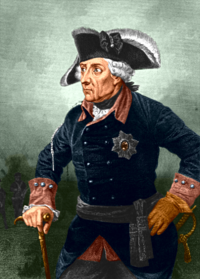
Frederick II the Great, King of Prussia.
1760s
- 1760: George III became King of Britain.
- 1762-96: Reign of Catherine the Great of Russia.
- 1766-99: Anglo-Mysore Wars
- 1767: Burmese conquered the Ayutthaya kingdom.
- 1768: Gurkhas conquered Nepal.
- 1768-1774: Russo-Turkish War
- 1769: Spanish missionaries established the first of 21 missions in California.
- 1769-73: The Bengal famine of 1770 killed one third of the Bengal population.
1770s
- 1770-1771: Famine in Czech lands killed hundreds of thousands.
- 1771: The Plague Riot in Moscow.
- 1772-1795: The Partitions of Poland ended the Polish-Lithuanian Commonwealth and erased Poland from the map for 123 years.
- 1772: Gustav III of Sweden stages a coup d'état and takes big political power, becoming almost an absolute monarch.
- 1773-1775: The Pugachev's Rebellion was the largest peasant revolt in Russia's history.
- 1775 John Harrison H4 and Larcum Kendall K1 Marine chronometers are used to measure longitude by James Cook on his Second voyage (1772-1775)
- 1775-1782: First Anglo-Maratha War
- 1775-1783: American Revolutionary War
- 1779-1879: Xhosa Wars between British and Boer settlers and the Xhosas in South African Republic

Scottish engineer and inventor James Watt.
1780s
- 1781: Spanish settlers founded Los Angeles.
- 1781-1785: Serfdom abolished in the Austrian monarchy (first step; second step in 1848)
- 1783: Famine in Iceland caused by Laki (volcano) eruption.
- 1783: Russian Empire annexed the Crimean Khanate.
- 1785-1791: Imam Sheikh Mansur, a Chechen warrior and Muslim mystic, led a coalition of Muslim Caucasian tribes from throughout the Caucasus in a holy war against the Russian invaders.
- 1785-95: Northwest Indian War between the United States and Native Americans
- 1787: Freed slaves from London founded Freetown in present-day Sierra Leone.
- 1787-1792: Russo-Turkish War
- 1788: First European settlement established in Australia at Sydney.
- 1789: George Washington elected President of the United States. Served until 1797.
- 1789-99: The French Revolution
1790s
- 1791-1804: The Haitian Revolution
- 1792-1815: The Great French War started as the French Revolutionary Wars which lead into the Napoleonic Wars.
- 1792: New York Stock & Exchange Board founded.
- 1793: Upper Canada bans slavery.
- 1793: The largest yellow fever epidemic in American history killed as many as 5,000 people in Philadelphia—roughly 10% of the population.
- 1793-1796: Revolt in the Vendée against the French Republic at the time of the Revolution.
- 1794: Polish revolt
- 1795: Pinckney's Treaty between the United States and Spain granted the Mississippi Territory to the US.
- 1795: The Marseillaise officially adopted as the French national anthem.
- 1795: Kamehameha I of the Island of Hawaii defeats the Oahuans at the Battle of Nu'uanu.
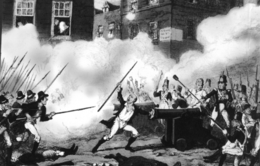 The Battle of New Ross took place in Ireland, during the Irish Rebellion of 1798.
The Battle of New Ross took place in Ireland, during the Irish Rebellion of 1798. - 1796: Edward Jenner administers the first smallpox vaccination. Smallpox killed an estimated 400,000 Europeans each year during the 18th century (including five reigning monarchs).
- 1796: Battle of Montenotte. Engagement in the War of the First Coalition. Napoleon Bonaparte's first victory as an army commander.
- 1796: British ejected Dutch from Ceylon.
- 1796: Mungo Park, backed by the African Association, is the first European to set eyes on the Niger River in Africa.
- 1796-1804: The White Lotus Rebellion against the Manchu Dynasty in China.
- 1797: Napoleon's invasion and partition of the Republic of Venice ended over 1,000 years of independence for the Serene Republic.
- 1798: The Irish Rebellion failed to overthrow British rule in Ireland.
- 1798-1800: Quasi-War between the United States and France.
- 1799: Napoleon staged a coup d'état and became dictator of France.
- 1799: Dutch East India Company is dissolved.
- 1799: The assassination of the 14th Tu'i Kanokupolu, Tukuʻaho, plunges Tonga into half a century of civil war.
Significant people
- Ahmad Shah Abdali, Afghan King
- John Adams, American statesman
- Samuel Adams American statesman
- Ethan Allen, American Revolutionary Army
- Queen Anne, British monarch
- Aurangzeb, Mughal Emperor
- Catherine the Great, Russian Tsaritsa
- Charles III of Spain, Spanish monarch
- James Cook, British navigator
- Charlotte Corday, killed Jean-Paul Marat
- Georges Danton, French revolutionary leader
- Benjamin Franklin, American leader, scientist and statesman
- Frederick the Great, Prussian monarch
- King George III, British monarch
- Alexander Hamilton, American statesman
- Patrick Henry, American statesman
- Thomas Jefferson, American statesman
- John Paul Jones, American naval commander
- Joseph II, Austrian Emperor
- Kangxi Emperor, China
- Marquis de Lafayette, Continental Army officer
- Alphonsus Liguori, Italian bishop, founder of Redemptorists, Saint
- Louis XV of France, French monarch
- Louis XVI of France, French monarch
- James Madison, American statesman
- Alessandro Malaspina, Spanish explorer
- Jean-Paul Marat, Influential French journalist
- Maria Theresa of Austria, Austrian Empress
- Marie Antoinette, Austrian-born Queen of France
- Michikinikwa, Miami tribe chief and war leader
- Charles de Secondat, baron de Montesquieu, French thinker
- José Moñino y Redondo, Count of Floridablanca, Spanish statesman
- Nadir Shah, Persian King
- Thomas Paine, British intellectual
- Peter I of Russia (Peter the Great), Russian Tsar
- Philip V of Spain, Spanish monarch
- Pius VI, Roman Pope
- Marquis of Pombal, Portuguese Prime Minister
- Chief Pontiac, Ottawa warrior
- Qianlong Emperor, China
- Francis II Rákóczi, prince of Hungary and Transylvania, Revolutionary leader
- Bartolomeo Rastrelli, Italian-born Russian architect
- Paul Revere, American patriot, silversmith
- Maximilien Robespierre, French revolutionary leader
- Betsy Ross, American flag maker
- John Small, English cricketer
- Edward "Lumpy" Stevens, English cricketer
- Alexander Suvorov, Russian military leader
- Toussaint L'Ouverture, Haitian revolutionary leader
- Túpac Amaru II, Peruvian revolutionary
- Muhammad ibn Abd al Wahhab, Arab Islamic theologian and founder of Wahhabism
- Robert Walpole, British Prime Minister
- George Washington, American general and first President of The United States
- John Wesley, British churchman, founder of Methodism
- Nikolaus Ludwig von Zinzendorf, German religious writer and bishop
Show business and Theatre
- Barton Booth, actor
- Colley Cibber, actor, poet, playwright
- Thomas Doggett, actor
- David Garrick, actor
- Charles Johnson
- Charles Macklin, actor
- Anne Oldfield, actress
- Hester Santlow, actress, ballerina, dancer
- Richard Brinsley Sheridan, playwright
- Robert Wilks, actor
Musicians, composers
- Tomaso Albinoni, Italian composer
- Johann Sebastian Bach, German composer
- François Couperin, French composer
- Christoph Willibald Gluck, German composer
- Francesco Geminiani, Italian violinist, composer, and music theorist.
- George Frideric Handel, German-English composer
- Joseph Haydn, Austrian composer
- Wolfgang Amadeus Mozart, Austrian composer
- Johann Pachelbel, German composer, teacher
- François-André Danican Philidor, French composer and chess master
- Jean-Philippe Rameau, French composer
- Domenico Scarlatti, Italian composer.
- Antonio Stradivari, Italian violin maker
- Antonio Vivaldi, Italian composer
Visual artists, painters, sculptors, printmakers
- William Blake, English artist and poet
- Edmé Bouchardon, French sculptor
- François Boucher, French painter
- Jean-Baptiste-Siméon Chardin, French painter
- John Singleton Copley, American painter
- Jacques-Louis David, French painter
- Étienne Maurice Falconet, French sculptor
- Jean-Honoré Fragonard, French painter
- Thomas Gainsborough, English painter
- Francisco de Goya, Spanish painter
- Jean-Baptiste Greuze, French painter
- William Hogarth, English painter and engraver
- Jean-Baptiste Lemoyne, French sculptor, student of his father
- Jean-Louis Lemoyne, French sculptor
- Robert Le Lorrain, French sculptor
- Sir Joshua Reynolds, British painter
- Gilbert Stuart, American painter
- Giovanni Battista Tiepolo, Venetian painter
- Jiang Tingxi, Chinese artist and scholar
- Kitagawa Utamaro, Japanese printmaker and painter
- Antoine Watteau, French painter
Writers, poets
- Ueda Akinari, Japanese writer
- Pierre Beaumarchais, French writer
- Robert Burns, Scottish poet
- Giacomo Casanova, Venetian adventurer, writer and womanizer
- Denis Diderot, French writer and philosopher
- Henry Fielding British novelist
- Johann Wolfgang von Goethe, German writer
- Eliza Haywood, English writer
- Samuel Johnson, British writer and literary critic
- Gaspar Melchor de Jovellanos, Spanish writer
- Pierre Choderlos de Laclos, French writer
- Yuan Mei, Chinese poet, scholar and artist
- Honoré Mirabeau French writer and politician
- Alexander Pope, British poet
- Jean-Jacques Rousseau, French writer and philosopher
- Marquis de Sade, French writer and philosopher
- Friedrich Schiller, German writer
- Charlotte Turner Smith, English writer
- Laurence Sterne, British writer
- Jonathan Swift, Anglo-Irish satirist
- Voltaire, French writer and philosopher
- Mary Wollstonecraft, British writer and feminist
- Cao Xueqin, Chinese writer
Scientists and philosophers
- Maria Gaetana Agnesi, Italian mathematician
- Jean le Rond d'Alembert, French mathematician, physicist and encyclopedist
- Laura Bassi, Italian scientist, the first European female college teacher
- George Berkeley, Irish empiricist philosopher
- Jeremy Bentham, English philosopher and reformer
- Daniel Bernoulli, Swiss mathematician and physicist
- Edmund Burke, British statesman and philosopher
- Alexis Clairault, French mathematician
- Eugenio Espejo, Ecuadorian scientist
- Leonhard Euler, Swiss mathematician
- David Hume, Scottish philosopher
- Edward Jenner, English inventor of vaccination
- Carl Friedrich Gauss, German mathematician, physicist and astronomer
- Immanuel Kant, German philosopher
- Joseph Louis Lagrange, Italian-French mathematician and physicist
- Pierre Simon Laplace, French physicist and mathematician
- John Law, Scottish economist
- Mikhail Lomonosov, Russian scientist
- Antoine Lavoisier, French chemist
- Adrien-Marie Legendre, French mathematician
- Carolus Linnaeus (Carl von Linné), Swedish biologist
- Adam Smith, Scottish economist and philosopher
- Emanuel Swedenborg, Swedish scientist, thinker and mystic
- Antonio de Ulloa, Spanish scientist and explorer
- James Watt, Scottish scientist and inventor
Inventions, discoveries, introductions
- 1709: The first piano was built by Bartolomeo Cristofori
- 1712: Steam Engine invented by Thomas Newcomen.
- 1717: The diving bell was successfully tested by Edmond Halley, sustainable to a depth of 55 ft.
- c. 1730: The octant navigational tool was developed by John Hadley in England, and Thomas Godfrey in America
- 1736: Europeans discovered rubber - the discovery was made by Charles-Marie de la Condamine while on expedition in South America. It was named in 1770 by Joseph Priestly
- c. 1740: Modern steel was developed by Benjamin Huntsman
- 1741: Vitus Bering discovered Alaska
- 1745: The Leyden jar invented by Ewald von Kleist was the first electrical capacitor
- 1751 - 1785: The French Encyclopédie
- 1755: The English Dictionary by Samuel Johnson
- 1755: The tallest wooden Bodhisattva statue in the world is erected at Puning Temple, Chengde, China.
- 1764: The Spinning Jenny created by James Hargreaves brought on the Industrial Revolution
- 1765: James Watt enhances Newcomen's steam engine, allowing new steel technologies
- 1761: The problem of Longitude was finally resolved by the fourth chronometer of John Harrison
- 1768–1779: James Cook mapped the boundaries of the Pacific Ocean and discovered many Pacific Islands
- 1771: The enormous Putuo Zongcheng Temple complex of Chengde, China is completed
- 1773–1782: The Qing Dynasty huge literary compilation Siku Quanshu
- 1776: The Wealth of Nations, foundation of the modern theory of economy, was published by Adam Smith
- 1779: Photosynthesis was first discovered by Jan Ingenhousz of the Netherlands
- 1798: Edward Jenner publishes a treatise about smallpox vaccination
- 1799: Rosetta stone discovered by Napoleon's troops
Decades and years
|
|||||||||||||||||||||||||||||||||||||||||||||||||||||||||||||||||||||||||||||||||||||||||||||||||||||||||||||||||||||||||||||||||||||||||
|
|||||||||||||||||||||||||||||||||||||||||||||||||||||||||||||||||||||||||||||||||||||||||||||||||||||||||||||||||||||
